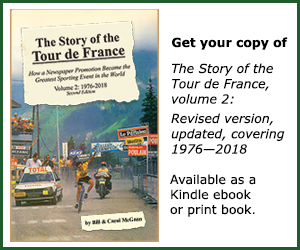Bicycle Racing News and Opinion,
Thursday, February 18, 2021
Back to news and opinion index page for links to archived stories | Commentary | Our YouTube page
2020 Tour de France | 2020 Giro d'Italia
The audiobook version of The Story of the Tour de France, Volume 1 is available.
The Universe is under no obligation to make sense to you. - Neil deGrasse Tyson
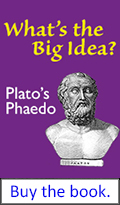
Upcoming racing:
- Feb 19 - 21: Tour des Alpes Maritimes et du Var
- Feb 21 - 27: UAE Tour
Cancelled & postponed races:
- Feb 3 - 7:
Volta a la Comunitat Valenciana(postponed) - Feb 9 - 14:
Tour of Oman(cancelled) - Feb 17 - 21:
Vuelta Cicista Andalucia - Ruta del Sol(postponed) - Feb 17 - 21:
Volta ao Algarve(postponed)
Latest completed racing:
- Feb 11 - 14: Tour de la Provence
- Feb 14: Clasica de Almeria
- Feb 3 - 7: Etoile de Bèsseges
- Jan 31: GP Cycliste la Marseillaise
- Jan 21 - 24: Santos Festival of Cycling
- Jan 23: Flandriencross
- Jan 1: GP Sven Nys Cyclocross
Interview with Groupama-FDJ’s Bruno Armirail
The team posted this interesting piece:
A major role player in David Gaudu’s victories during the last Vuelta, Bruno Armirail undoubtedly reached a new milestone in 2020, in a season that also saw him take bronze in the French time trial championship. Back to racing on Friday in the Tour des Alpes-Maritimes et du Var, alongside his mate from Brittany, the Frenchman agreed to deeply talk about the evolution of his career, and the direction he would now like to head to.
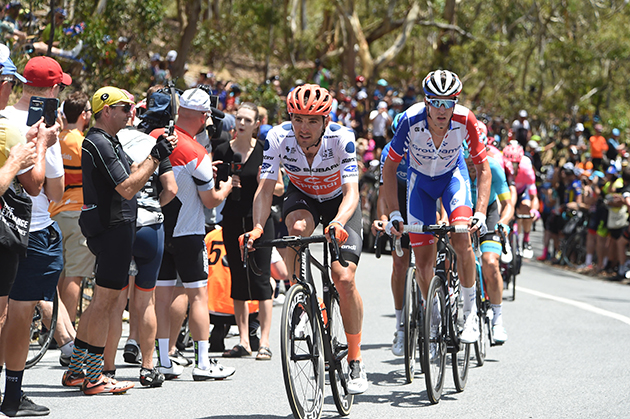
Joey Rosskopf leads Bruno Amirail in stage six of the 2020 Tour Down Under. Sirotti photo.
How was your winter, Bruno?
Shorter than usual. The Vuelta ended on November 8th and I resumed training on December 10th, which is much later than what it usually is. At first, I couldn’t ride much at home due to the weather. I didn’t want to fall behind, so I first did a personal training camp in Spain in late December-early January. I also needed to get the kilometers in the legs before the Tenerife camp, where I stayed 18 days. We got there with Simon [Guglielmi] on January 14th. There were just the two of us at first, then Rudy [Molard] arrived on the 18th. David [Gaudu] and Valentin [Valentin] joined us on the 19th, the day after the team presentation. The main goal was to do some basic work, especially for David and myself as we finished our season quite late. It was only at the very end that we did some intensity work.
Was it a first for you on the Teide volcano?
Yes, but I had already done altitude twice last year, in Tignes and at the Pic du Midi. What is special with the Teide is that when you are at the bottom, it takes two hours to go up. There are forty kilometers of climbing, that’s something. You can feel the altitude especially when sprinting up there; the lack of oxygen is more obvious. Once at the hotel, however, you don’t feel it that much. At least, I did not. Last year, I was at the Pic du Midi at almost 2,900 meters of altitude, and the lack of oxygen is more important there.
How come did you go for a training camp at the Pic du Midi?
Basically, I wanted to test the altitude training. In July, I had the opportunity to do three weeks in Tignes. It didn’t go too bad for my first races, so we wanted to do it again for the Vuelta. As the Pic du Midi is right next to my house, I thought that could be an option. I went through the procedures with the town hall of Bagnères-de-Bigorre, where I live, and I then met the director of the Pic du Midi who gave me the green light. In the past, the French fencing team also stayed there to prepare for the Olympic Games. The fact that it’s so close to home also made it easier for training: I know all the climbs around by heart. The goal was not necessarily to go that high, but it just happened that way. It was only for ten days, so it was worth a try. My coach and the team doctor also kept a close eye on me remotely. I was sending all my data on a daily basis. I had no problem. There were just two days when it was not possible to go down. It was very windy and the cable car was unusable. With my coach, we therefore decided that I would take the indoor trainer and stay at the top. There, I saw everything: bright sun, cloudy sky, rain, snow, wind. In ten days, I saw all the landscapes pass by. But above all, I felt in the Vuelta that this training camp had done me a lot of good.
Why did you try the altitude last year?
I had this idea in mind for a while, but it was difficult to implement due to my racing programs. In 2019, it was too complicated. If we had had a normal season last year, I don’t even know if I could have done it. The lack of racing actually allowed me to do the training camp in Tignes. The experience really started then. We took advantage of the circumstances to give it a go. It paid off in August and September, and then I had a 2-week gap between Tirreno and the Ardennes Classics. We thought it would be worth repeating the altitude ahead of the Vuelta. Nowadays, a lot of riders go in altitude, almost all the best actually, and some are really benefiting from it. So if it works for others, why wouldn’t it work for me? That can turn out to be a real advantage, and at our level, we have to stack all the odds in our favour.
Is this approach also a way for you to improve your climbing qualities?
Absolutely. I wanted to get back good skills in this area. I was a pretty good climber amongst the Amateurs, although it has nothing to do with the pros. Ever since I joined the team, I’ve always told my coach (David Han) that I would like to climb like I did before. I certainly have more power on the flat, but I wanted to regain that mountain pedal stroke. That’s why I do a lot of climbing now. That being said, I am not a great climber either. I am far from being like David or Thibaut, but doing these camps and a series of climbs at home can only do me good, that’s for sure. It won’t make me a Tour winner, you have to be realistic, but it will definitely allow me to perform better uphill.
Why did you want to add this string to your bow?
Because the world’s best teammates are the most versatile ones. Being a teammate on the flat is great, but if you really want to be among the best, you also have to get over the climbs. I am aware that I am not too bad in time trials, but would I win them all if I would fully commit to it? I’m not sure. So I told myself: “Why not try to get back to a good level in the mountains?” I don’t want to lose my power either, because it’s a real asset on the flat, but if I can get a good pedal stroke in the mountains again, it would become a real advantage over other riders. On the Vuelta for example, that’s how I was able to help David. If I had pulled on the flat but hadn’t passed the first climb, I wouldn’t have been really helpful. On the Grand Tours, a very good teammate must be versatile.
Is it then towards this role and this profile that you wish to head?
Exactly. I know very well that I will not be a great leader. I don’t have the skills to be one; one has to be down to earth. Since I joined the team, I know that in very big races, my role will be that of a teammate. That’s why I wanted to develop these qualities, to be one of the best in my field. It’s a role that I like and have always enjoyed doing. Even when at the beginning, under different circumstances, I was riding for Marc [Sarreau]. Except for a one-week race with a time trial like Tirreno-Adriatico last year, I know I won’t be able to be the leader, but my current role is more than enough for me.
At almost 27, do you feel like you’ve found your place in pro cycling?
Yes, but there is no more time to waste. We certainly know that when you get to the pros at 24, it’s already old. Now, the riders turn pro at 19-20. I’m not one of the oldest on the bike either, as I started quite late, but I need to maximize everything as much as possible. I don’t put any pressure on myself, but I know my best years are coming, and as I often hear, the career’s end comes sooner than you think. When I realize that I’m starting my fourth year on the team, it reminds me how quickly it goes. This is also the reason why I stack all the odds in my favour to perform as well as possible and thus have the best possible career.
Do you feel you still have a lot of room for improvement?
More than anything, I hope so. You can never know that beforehand, but you constantly have to push your limits, and that’s what I’ve been doing since I joined the team. I hope I can continue to improve over the next 3-4 years. I arrived quite late at the top level; I was injured for a very long time (triple fracture of the kneecap in 2015, note). My body was forced to rest and I wasted a lot of time – two years actually. I hardly raced over that period. Even today, it bothers me sometimes. I would have liked to see what it would have been like without this accident, to see what my worth would have been, to see what my career would have been like without the pain and without constantly thinking about my position on the bike, about the cleats’ adjustments. I didn’t have that kind of problem before, but I can now have knee pain if some things are not properly set. These are small details, but that inevitably leads to regrets. Sometimes I have pain and need to put on some ice. I need to do winter rehabilitation. This is all a waste of time, but it is like that.
When you started from scratch, did you still believe you could go pro?
Everyone tells me that I started from scratch, but for me, I started at -10. The one who starts from scratch has both legs in perfect condition. I started from scratch, but with pain and a small muscular handicap. So it’s below zero. I hit rock bottom. But yes, I always believed I could do it, otherwise I wouldn’t be where I am right now. I did what I needed to do, and the mindset obviously had a major part in that. Some might have given up, but I figured I could do it. I put all the chances on my side, I did everything to be able to succeed and I am today very happy that I did. But for sure it was not easy. If I had been told on the day of my accident “you will do the Vuelta someday”, I don’t know if I would have believed it. So when I had the opportunity to be a stagiaire for the team in 2017, it was already a huge relief. Then when I signed my contract it was a real release. I had certainly achieved some results, but I was starting to lose hope as I was getting a little old. The team gave me a great opportunity, and for that, I thank them again today. I will always be grateful. They gave me my chance and chose to bet on me.
Today, they will probably thank you too…
Maybe, but I’m here thanks to them. If they hadn’t been there, I wouldn’t be a pro as we speak.
Are you proud of your career course?
I am not a proud person. What I’ve done so far is okay, and I’m happy with the start of my career, but I haven’t won anything yet. Maybe I will this year, but so far I’m very fulfilled in what I do, in my job, in what I accomplish for my leaders.
Was the 2020 season a career-turning point for you?
For sure it was quite a good year, from the start of the season already in Australia (4th at Willunga Hill on the Tour Down Under). I then did the UAE Tour with David while it was not planned. After the lockdown, I did the Route d’Occitanie with Thibaut and then I was called up at the last moment to do the Dauphiné, still with Thibaut. For me, that was something to enter that group. I started to realize things were going well for me. In the French championship, I also noticed that my responsibilities were changing. At the briefing, I usually was named among the first ones to pull. This time, I was rather among the last ones. I understood that my status in the team had changed a bit, and then I was the first substitute for the Tour, which confirmed that feeling. After that, I found myself leader on Tirreno-Adriatico and then there was this Vuelta that changed a lot of things.
Have you gained confidence throughout this 2020 season?
When things are going well, we obviously gain more and more confidence. But most importantly, I trust my leaders, and everything is connected. When we trust each other, it can only go the right way and give each other a boost. La Vuelta is an exceptional case as David won the two stages where we broke away together. It won’t be like that all the time, but when he won the first one, it gave me a mental boost. You come to think that the work you do is rewarded. It is a whole. He motivated me because he knew that I could push my limits, be even stronger, and I kept telling myself that he was counting on me, that I had to do everything to help him the best way possible. The more the leader trusts his teammate, the more the teammate will have confidence in himself and in his abilities.
You said you’re not a proud person, but didn’t your performance in the Vuelta bring you some pride?
Of course I was happy with myself, but I was happier that David could finish it off. This is the main emotion, actually. The teammate can work all day, and do it well, but in the end only the victory counts. I could have been equally strong, but if he had been fifth at the finish, my work wouldn’t have looked so good. If there is a win, everyone will praise the teammate. If there is no win, no one is going to raise it. So yes, I was happy with my own performances, but much more with the fact that he pulled it off.
On the Vuelta, have you also learned to better channel your energy?
The Vuelta has surely made me evolve a lot from this point of view. Usually, I would most certainly have gone in the breakaway a few times, but this time the sporting directors told me: “You stay with David in the peloton, you will be his last teammate on the last climb”. It changed a lot of things. David might not have won both of his stages if I had been in the breakaway the days prior. On a Grand Tour, you have to be careful with everything; including… let’s say unnecessary efforts. When you save yourself, you are more likely to perform when you need to. A bad day can always happen, but we are still maximizing our chances and I noticed in the Vuelta that it really helped me. When we got to the mountains, I felt fresher. That being said, it’s also a role that I had never had before, and it comes with a certain pressure: you can’t miss out, you need to be there when there are only thirty guys left. Before, I rather was among the first ones to pull, to protect others from the wind, to sit up. I had never known this role, but eventually, it’s a role that I love. There is more responsibility, but it’s also rewarding to go further with your leader. I used to be afraid of having a lot of responsibility, but I like it now. Most of all, I’m starting to gain confidence and to realize that I can do it. From that point of view, 2020 has surely changed a lot of things in the team’s eyes. I’ll probably have more responsibilities, the team trusts me a lot more, and I’m very happy about that.
In 2021, the goal is to continue what you’ve started in 2020.
Absolutely, and we have created a real bond of trust with David. I have exactly the same program as him in the first part of the season. We have a good relationship; he’s a good friend, even out of the bike. We shared a lot of things together, victories especially. Among the four he’s got within the pro ranks, I was only absent in Romandie.
What about you? Are you looking forward to getting your first professional victory?
It is not really a priority and it also has to do with the team’s choices. I do what I’m asked to do. On the Vuelta, there were stages made for me, but I couldn’t break away. It was not my role. You can’t do as you please. If I am asked to take it easy in the Paris-Nice’s time trial because they need me the next day, I will do it without a problem. If one day I am given my chance, I will try to seize it to get this victory, but that being said, I also know that with the responsibilities that I now have in the team, it will be more and more complicated to get opportunities. I don’t think about it that much because when I go out for training, I mostly tell myself that I’m very lucky to be able to live off my passion, that many would like to be in my position. It would be a personal satisfaction to have at least one win on my record, but today I’m just really, really happy with what I’m doing.
Stefano Oldani: “Lotto Soudal made the right choice to sign so many young riders.”
Lotto-Soudal posted this:
What a start to the season it has been for Stefano Oldani and Filippo Conca, the Italian duo of Lotto Soudal. Oldani played an important role in Tim Wellens’ overall victory at the Etoile de Bessèges. Afterwards, the 23-year-old Milanese went on to clinch a top ten result in an uphill sprint at the Tour de la Provence. Filippo Conca - Oldani’s roommate during the Tour de la Provence - immediately took home the mountain jersey in what was his first race in the pro ranks.
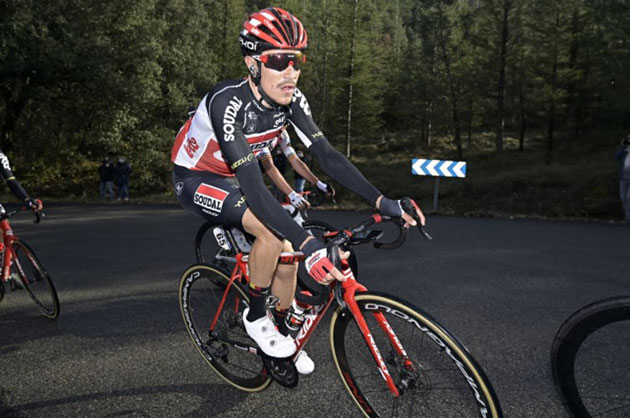
Stefano Oldani. Photo: Picture News
“To be honest, I didn’t have the best winter”, so begins Stefano Oldani. “The weather conditions in Italy weren’t very good at all. So my preparation was only average, and yet I was immediately up there during the first races. This obviously gives me confidence for what’s still to come.”
“My 8th place in Manosque at the Tour de la Provence made me really happy. Actually, the plan was to stay near Philippe Gilbert and launch the sprint for him, but then he got held up by that crash of Alaphilippe. So, I decided to give it a go myself and it turned out quite well, especially considering the strong field of riders. I have to admit that sprinting after such a climb was a first for me. I am hungry for more.”
Stefano Oldani, who turned pro at Lotto Soudal last year, is definitely feeling at ease with the heavily renewed and rejuvenated team.
“The past seasons have shown that a lot of young guys are immediately up there, performing at the highest level. In my opinion, Lotto Soudal made the right choice to sign so many youngsters. I already noticed their potential at the January training camp. We are all trying to learn as much as possible, it feels like I am studying at Harvard University. We learn so much from Phil, Tim and John. My bond with Philippe Gilbert is a special one and we really understand each other. He is a real champion, not only on the bike, but also as a person. During the races, I try to stay near him as long as possible. To be on the same team and to be sharing so much with him is really crazy as I have been admiring him ever since I was a little boy.”
Stefano Oldani’s first goal of the season will be Milan-Sanremo. Not for himself, but at the service of Philippe Gilbert. Afterwards, the Giro d’Italia looms.
“I already did well at the Giro last year. I surprised myself a little by finishing inside the top ten, twice. This season, I want to do better. I am not a pure sprinter, but I am quite fast when we are heading to the finish with a smaller group and I am not shy of an uphill sprint either. At the Tour de l’Avenir, I already came in third after a three-kilometre climb, after current Team Ineos riders Hayter and Pidcock. I still have some time to mark some Giro stages. We’ll see where my chances lie.”
Intermarché-Wanty-Gobert Matériaux to ride UAE Tour
Here’s the team’s update:
The Castle of Al Thafra is the decor for the World Tour season this Sunday. After the cancellation of the Tour Down Under and other races on Australian soil, the UAE Tour (2.WT, 21-27/02) received the honor to open the World Tour this year. The only race of this level in the Middle East takes place from February 21st to 27th. The seven stages cross deserts and cities of the seven Emirates on rolling roads. The wind often plays a role in the Middle East, but probably the two mountain top finishes and time trial will be the decisive factors for the overall classification of the seven day event.
The tour starts with a flat sprint stage, followed by a 15 kilometer time trial in the Al Hudyriat bike park. The third stage ends with the Jebel Hafeet climb (10,6km at 6,9%) and the fifth stage leads towards the top of the Jebel Jais (21,5km at 5,4%) in the north of the country. The penultimate stage visits the famous artificial archipelago Palm Jumeirah in Dubai, before one day later the successor of Adam Yates will be known in capital Abu Dhabi. Last season, the Briton was declared the overall winner after only five stages, because the final two days were suspended because of the emergence of the Covid pandemic. The races finish around 16h30, but a time difference of 3 hours between Abu Dhabi and the Central European Time has to be taken into account.
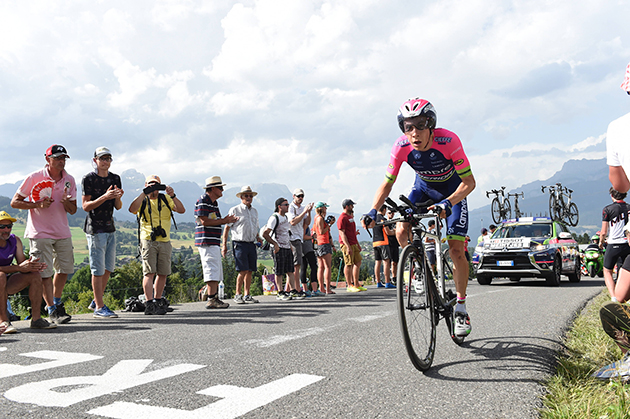
Louis Meintjes (shown at the 2016 Tour de France) will be wearing his new team colors at the UAE Tour. Sirotti photo
On his 29th birthday, Louis Meintjes will make his debut in the colors of Intermarché-Wanty-Gobert Matériaux. Next to the South-African, also climbers Jan Hirt and Simone Petilli will start their season in the Middle East. In contrary, Rein Taaramäe has already a proper race rhythm after the GP La Marseillaise and the Etoile de Bessèges. Italian sprinter Riccardo Minali, Dutchman Wesley Kreder and Belgian rider Kévin Van Melsen will also pin numbers for the first time this year, aiming for good results in the flat stages. The duo Valerio Piva and Aike Visbeek will make their debut as sports directors for Intermarché-Wanty-Gobert Matériaux in the United Arabic Emirates.
Valerio Piva (Sports Director):
“We have a strong and motivated line up for this first World Tour race of the season. Riccardo Minali is in a good shape and will receive the support of Wesley Kreder and Kévin Van Melsen during the flat stages. With Jan Hirt, Louis Meintjes, Simone Petilli and Rein Taaramäe we've got the necessary assets for the two mountain top finishes. After the first three days, including the time trial and the Jebel Hafeet climb, we'll have an idea about the general classification. Based on this, we'll decide who will be our protected rider in case of crosswinds at the end of the week.”
“Many top riders will be at the start in the Middle East, but just like for our riders, it will be a first test for everyone. So it's difficult to set precise goals. With his time trial capabilities, I hope Rein Taaramäe will be able to surprise me in the overall classification. With the GP La Marseillaise and the Etoile de Bessèges, which also contained a time trial, behind his back, the Estonian rider is already one step ahead of the others. Everyone is looking forward to start racing, so it promises to be a nice battle!”
Line up:
Jan Hirt
Wesley Kreder
Louis Meintjes
Riccardo Minali
Simone Petilli
Rein Taaramäe
Kévin Van Melsen
Sportive Direction:
Valerio Piva
Aike Visbeek
Team Qhubeka-Assos happy with season start
Here’s the team’s post:
Team Qhubeka ASSOS have made a very strong start to the 2021 road racing season; one which Head Sports Director Lars Michaelsen says: “has exceeded realistic expectations”.
Team Qhubeka ASSOS (formerly NTT Pro Cycling) – Africa’s UCI WorldTour team – only secured its future in the final months of 2020 and as such, compared to many of our competitors, entered the new season rapidly assembling all of the critical parts to be fully operational, at the highest level, by the time that racing resumed in 2021.
The team has competed at Étoile de Bessèges and Tour de la Provence, showing some strong early season form with the culmination being a first victory for Team Qhubeka ASSOS by the European and Italian champion, Giacomo Nizzolo, in Clásica de Almería.
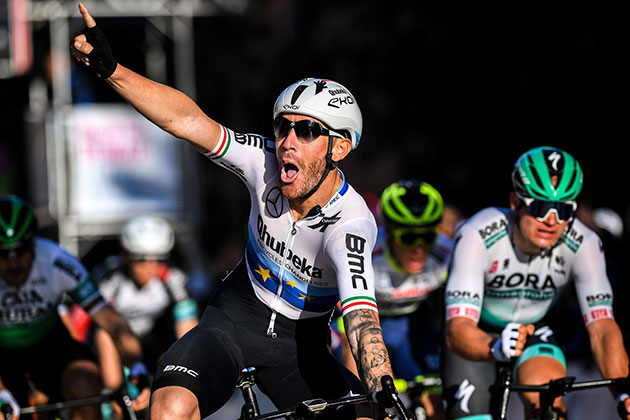
Giacomo Nizzolo wins this year's Clásica de Almería. Qhubeka-Assos photo
“The three races that we’ve been involved in, to kick off our season: Besseges, Provence and Almeria, all-in-all represents 10 race starts and two General Classifications. In total that is 12 classements, where Team Qhubeka ASSOS both have won one race and also secured another four top-10 places,” says Michaelsen. “If you consider some of the financial conditions that the team was in and from which we have built the roster, we could not realistically have expected those sorts of results so soon.”
Almost all of Team Qhubeka Assos riders were assembled near Girona for a pre-season training camp in late January which seems to have laid the groundwork for some of this early success, as Michaelsen illustrates.
“From the camp, where we unfortunately had Sergio Henao and Dylan Sunderland not available, my aim was – and it still is – to instill a spirit of “One Team”. This will be an ongoing theme throughout the season and it in fact falls perfectly in line with our team’s underpinning philosophy of “Ubuntu – I am because we are”. You’ll see that phrase emblazoned across all of our vehicles, as well as on the neck of our riders race jerseys.”
Michael Gogl finished sixth in the general classification of a very strong field in Bessèges and Giacomo Nizzolo sprinted impressively; while in Provence there was a clearer picture on where a number of our climbers are right now, which gives us hope for the races later on in the season. Fittingly, it was the European and Italian champion who secured our first victory.
“Every professional team wants to win and, if possible, right from the beginning of the season. With Giacomo Nizzolo’s win in “Clasica Almeria” we got just that – both a nice win and also an early win. Our hope throughout the season is, that we can pick out our days and surprise here and there. Of course these moments have to fall into what’s reasonable to expect from our team.”
Michaelsen is not getting ahead of himself just yet and knows that experience dictates that there will be some tough challenges to come, which the team will be well prepared for.
“Racing always highlights areas of success and improvement. I am happy that Douglas Ryder both gave me the freedom and relied on me when we had to piece this 2021 team together and I am proud of the sports management group that surrounds me. We have a good balance of preparing and planning things but also to handle things as they come.
"Like most teams we have already experienced some crashes as well as other setbacks but the spirit is to move forward which also is reflected by the feedback from our staff on the ground regarding needed or desired improvements to be made. That constructive feedback loop is crucial for us to try to better things. From the three races we raced, we drew some excellent elements out that are issues both needed to be resolved and aspects which are very encouraging; not all of them might be obvious to the public but as “One Team”, we will use these to build on and to improve for the season that lies ahead.”
Back to news and opinion index page for links to archived stories | Commentary



